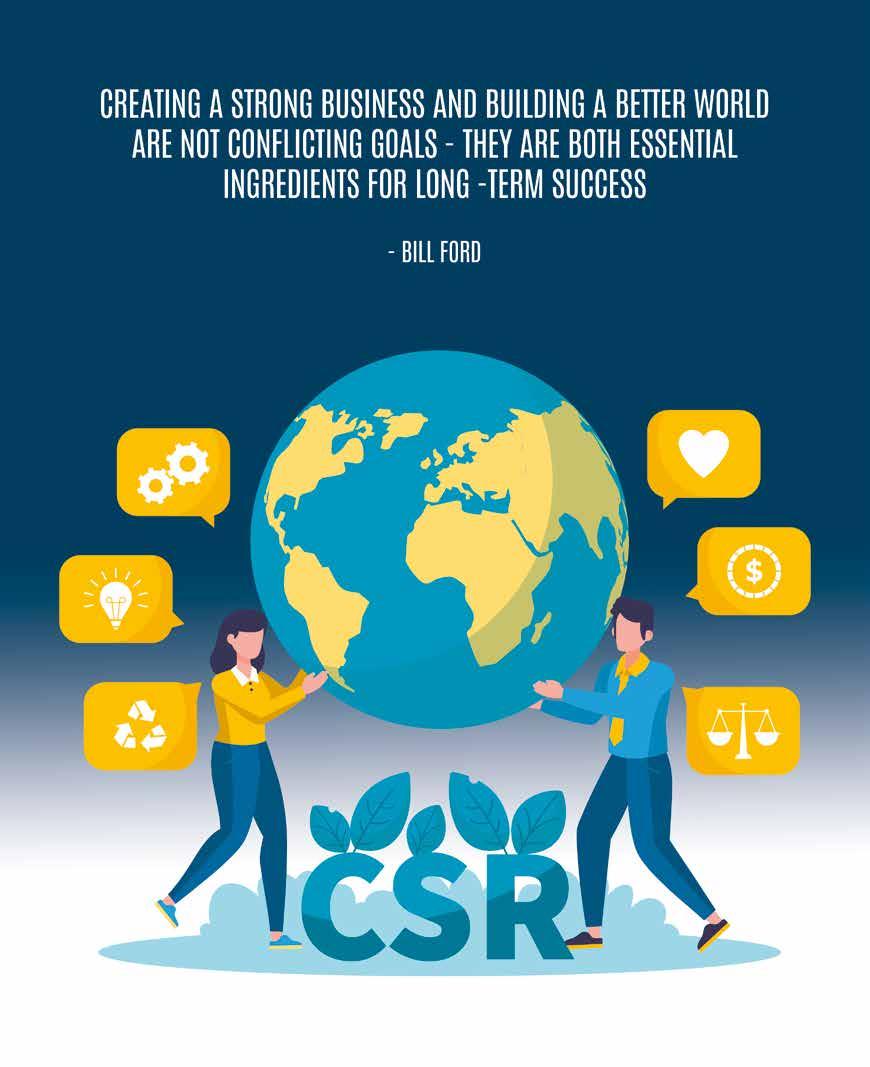







12 Feature ESG IS GOING TO HAVE A ROCKY 2023

15 Tijana Adamov Ignjatović, Founder of Campaigns with Purpose and Yellow Pants –Initiative for Childhood Study and CSR Concept Incubator THE POWER OF COMMUNICATIONS FOR A BETTER WORLD











12 Feature ESG IS GOING TO HAVE A ROCKY 2023

15 Tijana Adamov Ignjatović, Founder of Campaigns with Purpose and Yellow Pants –Initiative for Childhood Study and CSR Concept Incubator THE POWER OF COMMUNICATIONS FOR A BETTER WORLD


Doing business responsibly is an integral part of the operations of any business and even an essential policy for all companies, including smaller ones. The Responsible Business Forum works constantly to educate its members on dynamic changes in this field
It is almost impossible today to find a major company that doesn’t devote attention to responsible business principles. Regardless of whether that’s because it forms part of their strategy or because they believe it’s the only way to ensure long term business success, responsible business is certainly an increasingly integral part of business operations and even an essential policy. Smaller companies are now also paying ever more attention to their sustainability strategy, and this will also be an essential prerequisite to join the supply chains of large companies, considers Neven Marinović, executive director of the Responsible Business Forum (Smart kolektiv).
To what extent does Serbia respect the need to harmonise its legislative framework and practices with those of the EU? Serbia needs to harmonise its legislation with that of the EU to a large extent. How-
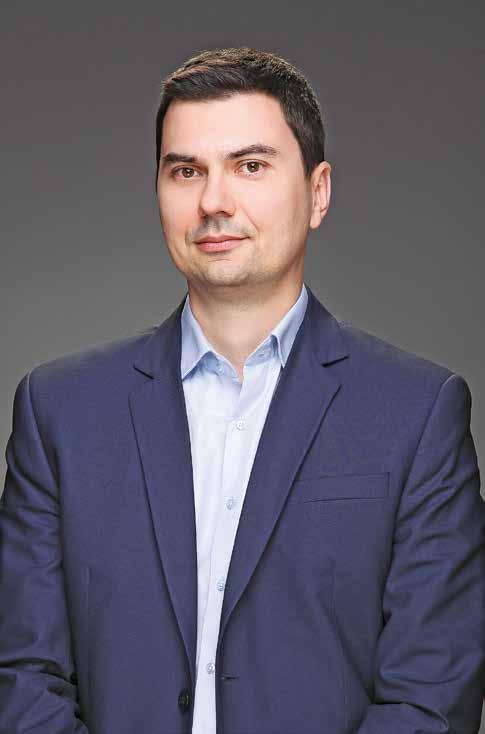
The Responsible Business Forum has always endeavoured to represent a place for its members to gather and a platform for exchanges of knowledge, experience and examples of advanced practices
ever, even in situations in which it is not harmonised, our companies that operate in the EU will still have to be in compliance with it. A good example is the EU’s Non-Financial Reporting Directive (NFRD). By drawing on this directive, the new Law on Accounting that was adopted in 2019 introduced the obligation to compile non-financial reports in the framework of annual business reports, starting from the beginning of 2021. This means that a certain number of companies, mostly larger ones, have to report on the non-financial part of their operations, which relates primarily to sustainability operations. Clear guidelines and standards that it’s obligatory to report on still don’t exist at the legislative level, but there are different methodologies that companies already apply. Having observed these deficiencies, the EU has already improved the existing directive and adopted a new one that envisages, among other things, the application of new European Sustainability Reporting Standards (ESRS) that are currently awaiting adoption. In this sense, requirements in Serbia should also be harmonised with the comparative new European practice and experience. Another important example relates to the German Supply Chain Act, which stipulates that companies that operate on the territory of this country are obliged to analyse sustainable operations across their entire supply chain – from the state of human rights, working conditions, environmental impact etc. This means that every company that does business with a German partner will also be exposed to this type of assessment and analysis.
How intensively is the responsible business concept changing today, considering the Green Agenda or the increasing inclusion artificial intelligence and automation in business processes?
The Green Agenda is now becoming a part of strategies, targets, management procedures and harmonisation with laws and regulations, but also an important factor in access to capital
A constant need exists to harmonise Serbian legislation with changes at the level of the European Union, which is very active in adopting regulations in the area of responsible business
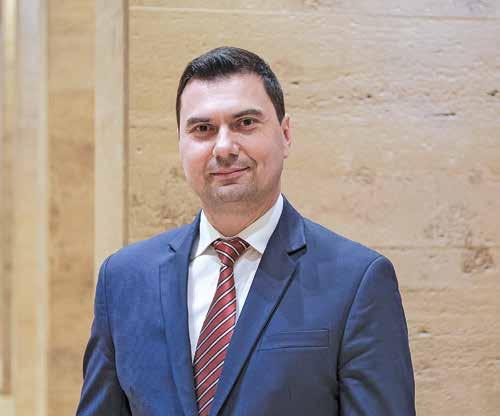
The Green Agenda, categorisation and other umbrella strategies and initiatives that are being adopted, both at the EU level and the global level, are certainly
having an enduring impact on shifting the impetus of this topic. What was previously treated as a kind of optional subject when it comes to companies is now becoming a part of strategies, targets, management procedures and harmonisation with laws and regulations. It has even gone a step further by linking access to capital with green agenda targets or sustainability goals. In practical terms, this means that a company will not be able to finance its growth through either commercial banks or development financial institutions if it is not in compliance with good practice and ESG criteria.
Does Serbia have enough professionals in this field; what represents the essential knowledge and skills that such professionals must possess?
Through a responsible and sustainable approach to business, small companies can even generate some savings, such as savings on energy and materials, ensure greater employee motivation and loyalty and, at the end of the day, gain access to the kind of cheaper capital that’s essential for further growth and development
A certain number of professionals in this field already exist in our country, and it’s questionable whether there are enough of them. Considering that the area they handle is quite broad – ranging from environmental protection, via employee relations and company conduct on the market, to philanthropic activities in the local community – it is clear that they must possess diverse knowledge. Nonetheless, I think the essential prerequisite for these professionals is the ability to observe things holistically, as opposed to observing from the perspective of one sector or function within a company, as well as the ability to establish an open dialogue with all key stakeholders. Of course, it is also necessary to have specific expert knowledge, which differs to some extent in relation to the industry to which a company belongs, as well as in relation to the specific focus of the position itself.
In which way does the Responsible Business Forum contribute to advancing knowledge in this area and training appropriate personnel?
The Responsible Business Forum has always endeavoured to represent a place for its members to gather and a platform for exchanges of knowledge, experience and examples of advanced practices, and it is thanks to cooperation with international partners and similar networks that it has also often been in a position to convey the latest information, trends and experiences from Europe and around the world, thus further empowering its members. Through a series of educational events, we have striven to familiarise our members with the principles of non-financial reporting, while we exchange experiences on the application of internationally acknowledged and widespread methodologies, such as the Global Reporting Initiative (GRI), and last year, for example, we also conducted training on an extremely relevant topic: the application of TCFD methodology related to the release of data on the impact of climate change on business operations.
We have prepared a series of ESG training courses to be conducted by the end of this year, which relate to the deter-
I think the essential prerequisite for these [CSR] professionals is the ability to observe things holistically, as opposed to observing from the perspective of one sector or function within a company, as well as the ability to establish an open dialogue with all key stakeholders
mining of material topics, due diligence in supply chains etc., as well as a series of thematic meetings at which we will familiarise members with the EU’s new sustainability reporting standards, in order to enable them to adapt to new requirements in a timely manner, but primarily to improve their reporting cycles in a way that’s standardised and internationally comparable.
Is responsible business a luxury that only large companies can afford, or are smaller companies also adopting similar trends?
Quite the contrary. Corporate social responsibility is often equated with philanthropy in our country, so in that context it’s considered that a company must have lots of funds in order to be able to also dedicate itself to that. But this is really a very important topic for small companies too, because they can even generate some savings through a responsible and sustainable approach to business, such as savings on energy and materials, ensure greater employee motivation and loyalty and, at the end of the day, gain access to the kind of cheaper capital that’s essential for further growth and development.
How much is the importance of the position of Chief Sustainability Officer (CSO) recognised in Serbia today and how enticing is this job to young personnel?
I think this position is poorly recognised in Serbia and only a small number of companies have such a defined position. This is conditioned to a large extent by the size of the market, as well as the fact that many companies define their strategies at their headquarters, ultimately only implementing and coordinating them here. Our task is to familiarise young people with jobs related to sustainability and to present various opportunities in this field to them. The Responsible Business Forum organises the “CSR practice” programme, through which 15 young people acquire knowledge about this topic each year, but also come into contact with professionals in this field who are already working at companies. Some of them receive opportunities to continue their advanced training with us, while some do so at member companies. This is one of the ways of developing and supporting this profession. Moreover, as of last year we’ve also been awarding “CSR professionals” awards, with the aim of indicating the existence of professionals in this field and highlighting, promoting and thanking them in some way, but also with the aim of pointing out the importance of their work for both companies and society as a whole.
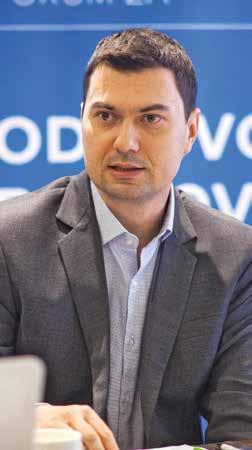
Henkel operates in three locations in Serbia. It is among the top 10 exporters and one of "100 most sustainable companies in the world". They have received many awards and accolades for their sustainable business practices, including those for socially responsible business

As leaders in sustainability, they strive to be pioneers of new solutions for sustainable development, actively support transformation towards a sustainable economy and society, help protect and regenerate nature, and contribute to the empowerment of communities... Dejan Davidović talks with us about all this
Henkel always puts the needs of its customers at the core of its business. What do consumers want?

The latest market trends show that consumers are more careful about choosing which brands to put in their shopping baskets. The key factor in making this decision is the price/quality ratio. Our company offers a very wide range of consumer products such as detergents and household chemicals and brands for consumer goods packaging, transport, metal, general industry, electronics and others.
Is sustainability a central element in your vision for the future?
Sustainability is undoubtedly a central element of our vision for the future. Last year, as part of our Sustainability Strategy, we presented the Strategic Framework for Sustainable Business 2030+ with long-term ambitions focused on three pillars to guide further progress: Regenerative Planet, Successful Communities and Trusted Partner. One of the examples of good sustainable business practice is our factory in Kruševac. This is the first factory in Serbia that was awarded the ISO 50001 certificate for energy efficiency, as well as the Gold LEED certificate
Our social engagement is based on four pillars: corporate volunteering, social partnership, brand engagement and emergency aid
for energy design. We achieved the goal of zero waste from our production, we installed heat pumps, we collect rainwater, and our site is connected to the city collector for treatment of sewage water. All other water generated in the production process is minimized and is processed or reused. We focus on energy from renewable sources, and we are currently working on a project for solar panels, biomass and general optimization to achieve the goal of zero CO2 emissions.
Commitment to the community is one of Henkel’s core values. You have received awards for some of these initiatives?
Our social engagement is based on four pillars: corporate volunteering, social partnership, brand engagement and emergency aid. To enable our staff to contribute actively to the community in areas of their own personal interest, Henkel was among the first to launch a corporate volunteering initiative called MIT (Make an Impact on Tomorrow). Last year we marked 15 years of implementation of this project in our country. We are very proud of the results, more than 70 employees volunteered in support projects for schools, kindergartens, hospitals and sports clubs. More than 163 projects with a total value of over € 650,000 were carried out across Serbia.
Three years ago, we launched the project “I Love the River, and You?!”, for which the chamber of commerce awarded us the national Đorđe Weifert award for socially responsible business. We also received the Benefactor award, which is awarded to the most responsible companies and organizations in Serbia.
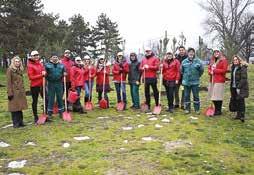
With its activities, OTP banka demonstrates continuously that it has incorporated responsible, sustainable and green operations into every segment of its business. Through its GENERATOR platform, it has recently launched a new, sixth cycle of its Generator ZERO contest, which supports innovators and their solutions for reducing the carbon footprint. Also, through this year's and fourth Social Entrepreneurship Fair and the Generator of Good Deeds, it will once again support socially and environmentally aware entrepreneurs that have innovative, organic and sustainable products. These are just some of the initiatives that the Bank implements with the aim of creating a greener and better future.
Milena Mićanović, Head of Communications and Public Relations at OTP banka emphasises that Generator ZERO is one of the Bank’s most important projects that is adapted to the needs of the market and social circumstances.
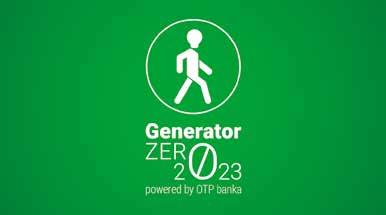
“Applications were open from 01 February to 15 March, and in a period slightly over a month, as many as 116 projects applied. Our jury, which includes representatives of OTP banka and partners, will have the difficult task of selecting the semi-finalists from the large number of solutions received, and then those who will be in the final. The winner will receive prize money of two million dinars and long-term expert support in the field of business expansion and identifying new opportunities, while our project partners will award the finalists”, stated Mićanović and added:
“It is important to emphasise this relates to corporate social responsibility initiatives, and at OTP banka we consider environmental protection and the development of the circular economy as spheres requiring the involvement of all of us. Precisely from this belief we are constantly seeking new initiatives and projects with which we will trace the path to a green future.”
Generator ZERO is OTP banka’s
most awarded project, and one of the awards it received is the Grand Prix of the French-Serbian Chamber of Commerce and the award of parent company OTP Group for the best ESG and sustainability project. Last year which was full of challenges for all economic actors, OTP banka also received prestigious awards from the international professional public, from Euromoney and The Banker, which declared it the best bank in Serbia. The Serbian Association of Managers also named OTP banka CSR company of the year.
This year as well during spring, through the Generator of Good Deeds initiative, OTP banka will draw attention to projects that are simultaneously striving to bring changes to society and strengthen domestic entrepreneurship. This programme
emerged in 2019 with the aim of affirming and strengthening the visibility of social entrepreneurship among domestic manufacturers that have a business model based on creativity and humanitarian or sustainable operations.
The previous, third iteration of this programme took place last October in Novi Sad. On this occasion, domestic entrepreneurs presented products that, through sales, support ecological projects or vulnerable groups like victims of domestic violence, persons with developmental disabilities, socially vulnerable children or women from displaced areas.
Apart from investing continuously in the environment, innovation and social entrepreneurship, OTP banka is also committed to many other areas. It nurtures long-
term partnerships with significant institutions, one of which is the Olympic Committee of Serbia. This cooperation represents the longest partnership in Serbian sports, which has lasted for 20 years, and serves as an example of successful cooperation between the business sector and sports institutions.
The Bank is also a strong advocate for the preservation of cultural and historical heritage, and the Gallery of Matica Srpska - one of the oldest and most credible institutions of culture in our country, has been its strategic partner in this area for the last seven years. It also supports literature, in cooperation with publishing house Booka, through the contest for the best hitherto unpublished novel. Following the great success of the first award competition, a new cycle of this project has been announced for 2023, with 15th May set as the deadline for the submission of manuscripts.
As the largest corporate and retail creditor, the market leader in factoring, leasing and e-commerce services, OTP banka will continue to move towards a sustainable society in the future, by providing support to the community, improving the quality of life, influencing the preservation of the environment and reinforcing sustainable business.
Coca-Cola HBC is among the first companies to have set science-based sustainability goals for itself, and achieving them involves the work of all employees, because
play in implementing sustainable practices
With us, taking care starts with saving on crucial resources, such as water and energy, is present in the producing and packaging of our products, and leads all the way to our active participation in dialogue on resolving important challenges in this area - explains Nina Elezović, as well as revealing how Coca-Cola views the link between business and ESG.
Coca-Cola HBC is a company that’s been operating in Serbia for a quarter of a century, demonstrating that taking care of business simultaneously means taking care of people, nature and communities. How would you describe sustainability from the perspective of your company?
Sustainability is a journey for us, not a destination. And, as such, sustainability demands a holistic approach. It isn’t just environmental protection, though these two terms are often seen as analogous. Sustainability is everything you do for the community in which you operate and for people, but likewise also defines the way you run your business, your relationship with partners and shareholders. And if I were to use the acronym ESG (environmental – social – governance), I would say that, as a business, these letters are each of equal importance to us.
Over the last 15 years, we’ve reduced our consumption of water per litre of beverage produced by more than 50 percent. We thereby save enough water to fill around 20
Olympic-sized pools every year. All three of our bottling plants and the factory of Bambi confectionary exclusively use electricity sourced from renewables. We are
sector has a role
thus reducing CO2 emissions with the goal of becoming carbon neutral by 2040, i.e., of removing as much carbon dioxide as we release into the atmosphere.
We introduced two major product packaging innovations last year. We replaced the plastic wrapping on four-can packs with a cardboard fastener that we call KeelClip, while we also began introducing tethered caps that remain attached to the packaging after opening. We always conclude the story of packaging with collection and recycling. I believe that the establishing of an appropriate deposit-return system in Serbia will lead to the achieving of the desired rates of packaging and recycling returns, and that all of us – as individuals, an industry and a society – will provide our contribution to creating a cleaner environment.
In 2021 alone, together with Bambi, you invested more than €750,000 in local communities, with the project ‘Vlasina – pure love’ standing out as a special community initiative. Why Vlasina and why pure love?
Rosa Water is a special gem in our portfolio. That’s why we treat Vlasina, the home of our Rosa, with special care. For us, Vlasina isn’t only nature that’s to be loved, but rather an emotion in and of itself. In the first year of the initiative, we supported local entrepreneurs, providing them with knowhow and skills to improve their businesses. The project’s second phase, which we are implementing in cooperation with the UNDP office, is currently underway. We are together building and landscaping 47 kilometres of hiking trails in the area above Lake Vlasina.
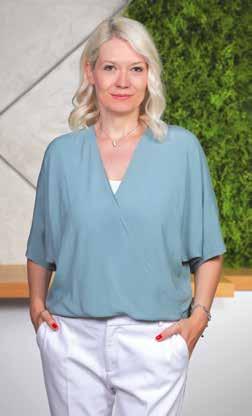
every
to
All three of our bottling plants and the factory of Bambi confectionary exclusively use electricity sourced from renewablesDžaferović, Eurobank Direktna, Corporate Communication
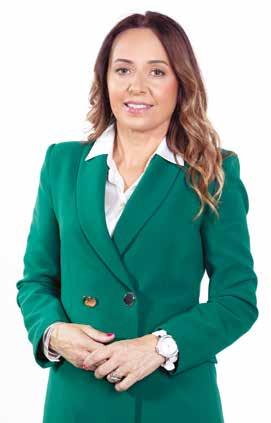
Through the School Designed for You project, we have equipped 13 computer labs in 11 Serbian cities, with more than 10 million dinars allocated for implementation
The bank has to date invested more than 4.8 million euros in numerous programmes and various projects to support the community, mainly in the areas of healthcare, education, environmental protection, culture and equality.
The business sector is supporting communities increasingly year-on-year. This has proven invaluable in crisis situations, but also beneficial under normal circumstances?
In the case of Eurobank Direktna, support to the community has been present since the very beginning of our operations in Serbia, when – 20 year ago – corporate social responsibility has been established as an integral part of the business strategy. Over the previous years, with a desire to provide comprehensive support to society, we have focused on areas needing help the most. This support hasn’t decreased even during difficult times, on the contrary, and thus our efforts during the COVID pandemic, when we strongly supported the healthcare sector, were highly noted publicly.
Do you have data on how much you’ve invested in various community support programmes and projects since 2003?
Through independent projects and participation in initiatives of our partners, we have invested so far more than 4.8 million euros, in areas such as healthcare, education, ecology, culture and equality. Despite all areas being of equal importance, over recent years support has been focused on two priorities: healthcare, particularly during the pandemic, and youth.
The “School Designed for You” project, intended for students of secondary
Since the very beginnings, Eurobank Direktna has been constantly committed to investing in the community where it operates. Owing to this strategy, the Bank became the first financial institution in Serbia to receive the CSR certificate granted by NALED, ten years ago

schools, remains among the priorities. Over the course of the previous five years, during which this project has been im -
plemented, 13 computer labs have been provided with necessary IT equipment in 11 Serbian cities, with more than 10 million dinars allocated for implementation.
Given that we also base our CSR activities on the promotion of culture, since last year the project has been enhanced by cooperation with the museum “House of Jevrem Grujić” and publishing house “Laguna”. Through the educational programme entitled “Travelling Museum”, students have an opportunity to get acquainted with Serbian history and culture, as well as various artistic skills. Additionally, Eurobank Direktna provided secondary school students with an opportunity to meet with great names of domestic literature, in cooperation with “Laguna”.
It was ten years ago that Eurobank Direktna became the first financial institution in Serbia to receive a NALED certificate of corporate social responsibility. Do you still adhere to those principles? Since the beginning of its operations in Serbia, Eurobank Direktna has adhered to the principles of supporting the society and local community in which operates, and the NALED certificate served as an additional incentive to continue developing in the same, responsible way. We have implemented numerous projects in the meantime, for example, within partnership with the famous football club, we have organized the Manchester United Soccer School, which, apart from being educational, also served to promote responsibility. And today, a decade after receiving NALED certificate, I am pleased to say that we still have the same goals, striving always to be a good partner to the community, employees, and partners, but primarily to our clients.
Bex is the first and only courier service in Serbia that has imported Eco 100% electric zero emission vehicles. The project called Think Green, Do Good introduced a major environmental innovation to the postal services market
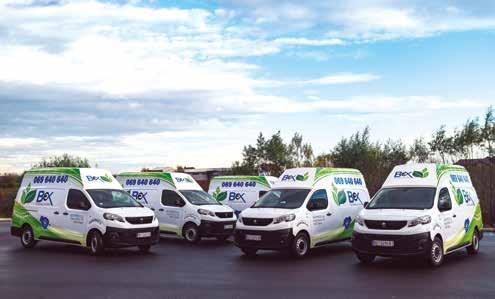
in Šabac and Smederevo.
“First of all, we wanted to set an example that others would follow and to show that every company in Serbia can contribute, like us, to raising environmental awareness”, says Bexexpress.
At the end of 2022, 120 vehicles with 100% electric drive were active, and the savings were 20% compared to the consumption of diesel vehicles. Fully 81 vehicles have been ordered for 2023. With this order, one third of the Bex fleet will be electric, and about 45% of courier vehicle kilometres will be electric and completely green.
First of all, we wanted to set an example that others would follow, and to show that every company in Serbia can contribute, like us, to raising environmental awareness - says one of the leading domestic courier services, which accounts for a quarter of the Serbian market.
Bexexpress is a courier service registered for commercial post that has been operating successfully in Serbia for 12 years. It currently accounts for a quarter of the Serbian market. As a major delivery company, Bex has been expanding its distribution network for years, and their goal of meeting the needs of their customers has required ever more delivery vehicles. The Bex vehicle fleet has grown to more than 700 delivery vehicles in 2023. As a socially responsible company, Bex started thinking a few years ago about reducing its carbon footprint, so at the end of 2020, they imported the first eco vehicles.
While increasing their eco fleet, Bex has started building solar power plants with a capacity that can support charging their electric vehicles
The importance of these vehicles is obvious, because they do not use any combustion products, they are completely silent, suitable for city driving, especially for parts of the city where it is not desirable to make noise, near hospitals, kindergartens, children’s playgrounds, nursing homes.
Congestion on the streets of our capital, pollution and noise were a signal that Belgrade needs exactly these vehicles and that they are our precious chance to reduce our harmful impact on the environment. After Belgrade, eco delivery vehicles have become available
While increasing their eco fleet, Bex has started building solar power plants with a capacity that can support charging their electric vehicles. So far, five solar power plants with a capacity of 300 kW have been built at three locations in Šabac, then at the business centre in Smederevo and at the buildings of the main logistics centre on Pančevački put in Belgrade, with a total area of solar panels of about 1,400 m2. This ensures not only a financial efficiency, but also the socially responsible operation of the company, primarily in terms of environmental protection.
The Bex fleet is planned to have 545 electric and 50 CNG heavy cargo vehicles by 2027. With the expansion of distribution networks, the network of solar power plants will also expand to enable electric charging and delivery by Bex eco vehicles all over the country.
Bex is a responsible member of the community. They are dedicated to the protection of people and the environment. They promote environmentally safe technologies, they aim to prevent pollution, promote recycling and reduce waste. The staff are instructed to respect the environment and not to harm it with their activities.

If 2021 was the year ESG became mainstream in the financial world, then 2022 was the year things got bumpier. And everything around ESG points to 2023 being even more intense
Before diving into why, let’s define terms. ESG is not sustainability. ESG — the acronym stands for environmental, social, and governance — has been mostly focused on screening companies as investments, largely by understanding how a business is affected by environmental and social issues (with an additional focus on whether a company has good governance in place
to manage those risks and pressures).
Sustainability is a much broader idea, focusing on a company’s role in society, how it creates value by managing its environmental and social impacts (both positive and negative), and how its actions affect a wide range of stakeholders.

On the ESG front, there are two different forms of backlash going on. First is the political theater, mostly in the U.S., of the
“anti-woke” movement. Some right-wing governors and attorneys general are unhappy with investors that have, for example, set goals to get to zero carbon emissions in their portfolios. They say the investors are progressives and “politically motivated, anti-free market, anti-family.” With much fanfare, some U.S. states are pulling funds from high-profile investors like BlackRock (although the billions withdrawn are not likely to seriously worry companies with trillions under management).
The absurdity of calling investors and ESG “woke” is a longer discussion, but I’ll quote BlackRock’s CEO, Larry Fink, on the subject: “Stakeholder capitalism is not about
politics. It is not a social or ideological agenda. It is not ‘woke.’ It is capitalism, driven by mutually beneficial relationships between you and the employees, customers, suppliers, and communities your company relies on to prosper.” Un-
heat up as we head toward another U.S. presidential race (lord help us). But the roots of the sustainability movement are too deep now to get fully derailed. There is a second backlash to contend with. The investment community’s skeptics
pandemic — and then got slammed. With the inherent levels of irrationality and unpredictability in the stock market, asking “Does it outperform?” is a bad question, especially if you’re looking at a short time frame. It’s also a question
fortunately for Fink, he’s getting pressure from all sides now — some people say he’s greenwashing — but he’s not wrong on this fundamental point: Pleasing stakeholders and serving the common interest, including the planet’s, is how to create value today. It’s better business.
We should never underestimate the potential for politically motivated attacks to change how companies behave. Vanguard, for instance, showed a weak backbone when it recently abandoned a global accord on net-zero carbon targets for investments. Reuters credited “pressure from Republican U.S. politicians” for Vanguard’s action. And things will only
are getting louder again. They question ESG investing, asking, in essence, “Will ESG funds outperform ‘regular’ funds?” For a few years before and during the pandemic, ESG funds did do better. Then, in 2022, they didn’t. A major reason for both trends is that ESG funds are techheavy, and tech skyrocketed early in the
that isn’t asked about other investment strategies. No new fund designed to invest in tech companies or health care players, for example, has to prove that it will always outperform. The only thing that, with high certainty, consistently outperforms index funds that track the market is … well, nothing, really.
But the questions about ESG will continue, in part because huge swaths of the investment world still don’t get it. Last year, an executive at HSBC declared that this ESG thing is mostly bogus — and, oddly, he was the head of sustainable investing. He didn’t last long. A recent Financial Times article also provided a

Pleasing stakeholders and serving the common interest, including the planet’s, is how to create value today
typical and deep-seated view from the financial world: The authors declared that “investor altruism … will take a back seat to cold hard returns in 2023.”
The assumption is that using ESG as an investment screen is just philanthropy, but it truly is not altruism. The investors that get it understand that ESG gives a critical view on the risk of a business and helps gauge how resilient or ready for a low-carbon future a company might be. The Financial Times authors went on to cite the incredibly tired argument from Milton Friedman that the core purpose of a business is to serve shareholders. It’s clear that if the ESG movement disappeared, a lot of investors, many C-suite execs, and, apparently, some financial journalists would breathe a sigh of relief. Finally, they’d say, we can get back to business.

This is the fundamental disconnect. Sustainability is good business, and the forces driving it are not going away. The real work of sustainability — not just filling out endless ESG questionnaires — will continue. Companies pursuing a sustainability strategy will be working toward zero carbon, addressing human
rights issues in their supply chains, innovating products and services to satisfy customers that want more sustainable options, engaging employees and other stakeholders in the mission and purpose of the company, partnering with peers on shared problems, and much more.
Stepping back, it’s clear that the sustainability movement is, if anything, accelerating. For example, the percentage of S&P 500 companies including ESG metrics in compensation plans rose to 70% in 2022, up from 57% just a year earlier, with measurements of carbon footprint and diversity and inclusion growing the fastest.
This shift is not just a fad or driven only by media attention. The underlying drivers of change — big, sweeping trends
— are real, growing, and unavoidable. First, there are clear existential threats to humanity, particularly climate change and inequality, and these problems are already costing business and society real money. The cost of doing nothing is rising. Second, the cost of action has dropped exponentially, especially in clean energy and transportation. But third and perhaps most importantly, norms are changing. Stakeholders, especially young customers and employees, increasingly want companies to act. These are the gigatrends ultimately driving all the attention on sustainability. When societal norms and values change, they don’t easily go back.
I’ve been working in the overlap of business and society for 20 years. I’ve seen a lot of ups and downs in people’s interest in environmental and social issues. But the challenges we face are no longer theoretical models to debate. They’re here now — and the generations taking over the workforce know it. ESG will get banged around for political points and by investors annoyed by the whole thing, but the underlying work to move to a thriving future will continue to accelerate.
The real work of sustainability — not just filling out endless ESG questionnaires — will continue
The Festival of CSR Communication “Campaigns With Purpose” (Kampanje sa svrhom) will be held for the third time this year. The Festival will take place on 20th November, World Children’s Day, because its initiator, “Yellow Pants CSR Concept Incubator”, was itself launched by one sentence of Dr Maria Montessori: “Directing our action toward mankind means, first and foremost, doing so with regard to the child”
This festival is unique in Serbia and Europe, but also one of the first advertising festivals of this kind worldwide, dedicated specifically to CSR communication.
Today, when we’ve started placing a focus on corporate social responsibility, investments in CSR communication are on the rise and ESG is being applied, there is no dilemma that this festival “catches the moment”.
The Campaigns With Purpose Festival recognises, awards and encourages corporate social responsibility campaigns, in the belief that we really can change the world for the better by using the power of communication.
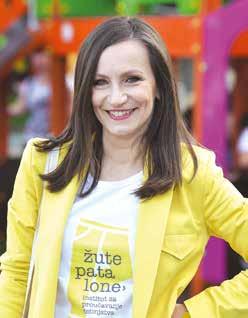
The title “Campaign With Purpose” is attached to a campaign that uses the power of communication to raise attention regarding a certain problem and even shows a way to solve that problem. A “Campaign With Purpose” is a campaign that’s dedicated to the welfare of children, people and society as a whole, focused on one of the 17 sustainable development goals (SDGs) of UN Agenda 2030.
The festival proclaims the three best CSR campaigns in Serbia: CAMPAIGN WITH PURPOSE GRAND PRIX and recognises purposeful campaigns by awarding the “Campaign With Purpose” title, with recipients receiving a statuette made from ecological materials, in the spirit of the Festival. The statuettes are presented
at the official award ceremony.
Decisions on awarding the title are made by Honoured Selectors (Jury) comprising professionals from all relevant sectors – corporate,
An initial focus on child welfare ensured that the festival welcomed sustainability even more, because sustainable development is in essence a battle for the survival of future generations
entrepreneurial, education, media and psychology.
Many socially responsible companies and agencies have so far participated in the festival, with the best campaigns awarded. However, even more companies are expected to join and start creating CSR communication campaigns for the betterment of all.
An initial focus on child welfare ensured that the festival welcomed sustainability even more, because sustainable development is in essence a battle for the survival of future generations.
Alongside the festival, “Campaigns With Purpose” also represents a CSR communication platform that encourages efficient CSR communication. It has also established a spring edition of the festival, under the title “WARM UP”, which is dedicated to learning new, innovative and unique ways of thinking and creative techniques that help create impactful communication.
The first WARM UP Festival was held in 2022 and the second took place in March 2023. International guest speakers offered us ways to solve ecological problems in Serbia by using only our creativity and thinking.
“Campaigns With Purpose” is also a CSR Concept Incubator that offers consultancy services and the creation of efficient CSR communication, organising tailor-made workshops for creative thinking and learning.
